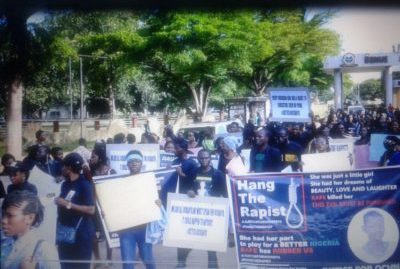A Pakistani court has overturned the death sentence of a Christian woman convicted of blasphemy, a case that has polarised the nation.
Asia Bibi was convicted in 2010 after being accused of insulting the Prophet Muhammad in a row with her neighbours.
She always maintained her innocence, but has spent most of the past eight years in solitary confinement.
The landmark ruling has already set off protests by hardliners who support strong blasphemy laws.
There was a heavy police presence at the Supreme Court in Islamabad as many feared violence could break out.
People have also been gathering for protests against the verdict in Karachi, Lahore and Peshawar, and hundreds blocked a road between Rawalpindi and Islamabad, Dawn newspaper reported.
Chief Justice Saqib Nisarm, who read out the ruling, said Asia Bibi could walk free from jail in Sheikupura, near Lahore, immediately if not wanted in connection with any other case.
She was not in court to hear the ruling, but reacted to the verdict from prison with apparent disbelief.
“I can’t believe what I am hearing, will I go out now? Will they let me out, really?” AFP news agency quoted her as saying by phone.
The trial stems from an argument Asia Bibi, whose full name is Asia Noreen, had with a group of women in June 2009.
They were harvesting fruit when a row broke out about a bucket of water. The women said that because she had used a cup, they could no longer touch it, as her faith had made it unclean.
Prosecutors alleged that in the row which followed, the women said Asia Bibi should convert to Islam and that she made three offensive comments about the Prophet Muhammad in response.
She was later beaten up at her home, during which her accusers say she confessed to blasphemy. She was arrested after a police investigation.
Laws enacted by the British Raj in 1860 made it a crime to disturb a religious assembly, trespass on burial grounds, insult religious beliefs or intentionally destroy or defile a place or an object of worship, punishable by up to 10 years in jail.
Several more clauses were added in the 1980s by Pakistan’s military ruler Gen Zia ul-Haq.
The judges said the prosecution had “categorically failed to prove its case beyond reasonable doubt”.
The case was based on flimsy evidence, they said, and proper procedures had not been followed. The alleged confession was delivered in front of a crowd “threatening to kill her”.
The ruling heavily referenced the Koran and Islamic history. It ended with a quote from the Hadith, the collected sayings of the Prophet Muhammad, which calls for non-Muslims to be treated kindly.
Islam is Pakistan’s national religion and underpins its legal system. Public support for the strict blasphemy laws is strong.
READ ALSO: Leicester City owner’s wife, son visit crash site
Yemen conflict: Mattis and Pompeo urge swift ceasefire
US Defence Secretary Jim Mattis and Secretary of State Mike Pompeo have both called for a swift ceasefire in Yemen.
Mr. Mattis said the US wanted to see all sides around the negotiating table and an end to air strikes within 30 days.
In a separate statement, Mr Pompeo said UN-led negotiations to help end the civil war should resume next month.
Yemen faces a growing humanitarian disaster as the four-year-old conflict drags on.
US President Donald Trump’s administration is under growing pressure over its support for the Saudi-led coalition that backs the Yemeni government against Houthi rebels.
Critics say coalition bombing is causing an unacceptable number of civilian deaths and fuelling the humanitarian crisis.
The murder of the journalist, Jamal Khashoggi, in the Saudi consulate in Istanbul has intensified the focus on the US-Saudi relationship.
Mr. Mattis, speaking at the US Institute of Peace in Washington, said the US had been watching the conflict “for long enough”.
“We have got to move towards a peace effort here, and we can’t say we are going to do it some time in the future. We need to be doing this in the next 30 days,” he said.
He added that all sides were being urged by the US to meet UN special envoy Martin Griffiths in Sweden in November and “come to a solution”.
In a separate statement, Mr. Pompeo called for all coalition air strikes in Yemen’s populated areas to stop. He also urged Houthi rebels to cease firing missiles into Saudi Arabia.
“It is time to end this conflict, replace conflict with compromise and allow the Yemeni people to heal through peace and reconstruction,” he said.
Mr. Pompeo said peace talks planned by Mr. Griffiths for November would aim to “implement confidence-building measures to address the underlying issues of the conflict, the demilitarisation of borders and the concentration of all large weapons under international observation”.
Yemen has been devastated by a conflict that escalated in early 2015, when Houthi rebels seized control of much of the west of the country and forced President Abdrabbuh Mansour Hadi to flee abroad.
Almost 10,000 people – two-thirds of them civilians – have been killed and 55,000 others injured in the fighting, according to the United Nations.












